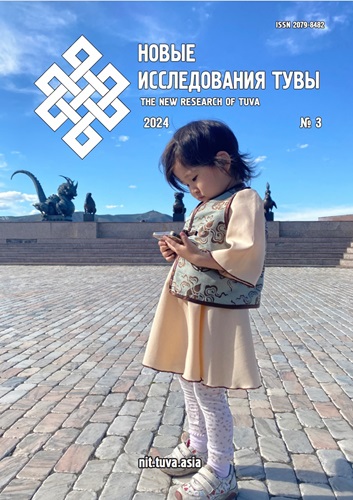The effect of screen time on the circulatory system in children and adolescents (a review of studies in the regions of the world)
DOI:
https://doi.org/10.25178/nit.2024.3.9Keywords:
дети; электронное время; артериальная гипертензия; ожирение; дислипидемияAbstract
The article provides an overview of scientific research on the impact of screen time on children's cardiovascular health. It considers the results of studies published between 2018 and March 1st, 2024, which assess the effects of screen time on functional state, metabolism, and cardiovascular health in children from different regions around the world.
The analysis takes into account geographical location when considering research findings. Negative effects of screen use on cardiovascular health include eating disorders, sleep deprivation, decreased physical activity, elevated blood pressure, and increased levels of atherogenic lipids in children's blood. In Mongoloid children, there is a correlation between problematic screen use and obesity, especially among boys.
References
Agapitov, L. I. and Cherepnin, I. V. (2019) Diagnostics and treatment of arterial hypertension in children and adolescents, overview of new clinical guidelines of the American Academy of Pediatrics. Rossiyskiy Vestnik Perinatologii i Pediatrii (Russian Bulletin of Perinatology and Pediatrics), vol. 64, no. 4, pp. 114–127. (In Russ.). DOI: https://doi.org/10.21508/1027-4065-2019-64-4-114-127
Andreevskaia, M. V. and Mar'ianovich, A. T. (2019) Leptin in food intake regulation. Russian Biomedical Research, vol. 4, no. 4, pp. 33–38. (In Russ.).
Erina, A. M., Rotar', O. P., Solntsev, V. N., Shal'nova, S. A., Deev, A. D., Baranova, E. I., Konradi, A. O., Boitsov, S. A. and Shliakhto, E. V. (2019) Epidemiology of Arterial Hypertension in Russian Federation – Importance of Choice of Criteria of Diagnosis. Kardiologiia, vol. 59, no. 6, pp. 5–11. (In Russ.). DOI: https://doi.org/10.18087/cardio.2019.6.2595
Semenova, N. B., Tereshchenko, S. Iu., Evert, L. S., Zaitseva, O. I. and Shubina, M. V. (2020) Prevalence of internet-addiction among adolescents of central siberia. Zdravookhranenie Rossiiskoi Federatsii, vol. 64, no. 1, pp. 36–44. (In Russ.).
Sergienko, I. V. (2023) Russian clinical guidelines for lipid metabolism disorders 2024 What's new? Russkii meditsinskii zhurnal, no. 4, pp. 12–16. (In Russ.).
Evert, L. S., Tereshchenko, S. Iu., Zaitseva, O. I., Semenova, N. B. and Shubina, M. V. (2020) Internet addiction in adolescents in Central Siberia: analysis of prevalence and structure of consumed content. Bulletin of Siberian Medicine, vol. 19, no. 4, pp. 189–197. (In Russ.). DOI: https://doi.org/10.20538/1682-0363-2020-4-189-197
Cartanyà-Hueso, À., Lidón-Moyano, C., Martín-Sánchez, J. C., González-Marrón, A., Pérez-Martín, H. and Martínez-Sánchez J. M. (2021) Association between recreational screen time and excess weight and obesity assessed with three sets of criteria in Spanish residents aged 2–14 years. Anales de Pediatria, vol. 97, issue 5, pp. 333–341. DOI: https://doi.org/10.1016/j.anpede.2021.09.004
Chang, R. Y., Chen, T. L., Yeh, C. C., Chen, C. H., Wang, Q. W., Toung, T. and Liao, C. C. (2023) Risk of Obesity Among Children Aged 2–6 Years Who Had Prolonged Screen Time in Taiwan: A Nationwide Cross-Sectional Study. Clinical Epidemiology, vol. 15, pp. 165–176. DOI: https://doi.org/10.2147/CLEP.S382956
Doh, Y. Y., Kim, B., Lee, S. and Gweon, G. (2020) The Cyclic Value-Context Reinforcement Model of Problematic Internet Use: Empirical Validation Using a Thematic Analysis of Children’s Counseling Data. Journal of Medical Internet Research, vol. 22, no. 7., article e17996. DOI: https://doi.org/10.2196/17996
Farhangi, M. A., Fathi, A. E., Manzouri, A., Rashnoo, F. and Shakarami, A. (2023) Prolonged screen watching behavior is associated with high blood pressure among children and adolescents: a systematic review and dose-response meta-analysis. Journal of Health, Population and Nutrition, vol. 42, no. 1, article 89. DOI: https://doi.org/10.1186/s41043-023-00437-8
Ghasemirad, M., Ketabi, L., Fayyazishishavan, E., Hojati, A., Maleki, Z. H., Gerami, M. H., Moradzadeh, M., Fernandez, J. H. O. and Akhavan-Sigari, R. (2023) The association between screen use and central obesity among children and adolescents: a systematic review and meta-analysis. Journal of Health, Population and Nutrition, vol. 42, no. 1, article 51. DOI: https://doi.org/10.1186/s41043-023-00391-5
Hernández-Luengo, M., Álvarez-Bueno, C., Alfonso, M. E. V., Tébar, A. R., Notario-Pacheco and B., Martinez-Vizcaino, V. (2021) Association between Screen Time and Cardiometabolic Risk Factors and Academic Achievement among Children. International Journal Pediatric Research, no. 7, article 081. DOI: https://doi.org/10.23937/2469-5769/1510081
Hu, J., Ding, N., Yang, L. Ma, Y. and Wen, D. (2019) Association between television viewing and early childhood overweight and obesity: a pair-matched case-control study in China. BMC Pediatrics, vol. 19, article 184. DOI: https://doi.org/10.1186/s12887-019-1557-9
Hutton, J. S., Dudley, J., Horowitz-Kraus, T., DeWitt, T. and Holland, S. K. (2020) Associations between screen-based media use and brain white matter integrity in preschool-aged children. JAMA Pediatris, vol. 174, no. 1, article e193869. DOI: https://doi.org/10.1001/jamapediatrics.2019.3869
Idrees, B., Sampasa-Kanyinga, H., Hamilton, H. A. and Chaput, J. P. (2024) Associations between problem technology use, life stress, and self-esteem among high school students. BMC Public Health, vol. 24, article 492. DOI: https://doi.org/10.1186/s12889-024-17963-7
Ikeda, I., Fujihara, K., Yoshizawa, S.M., Takeda, Y. Ishiguro, H, Yamada, H.M, Horikawa, C., Matsubayashi, Y., Yamada, T., Ogawa, Y. and Sone, H. (2024) Association between screen time, including that for smartphones, and overweight/obesity among children in Japan: NICE EVIDENCE Study 4. Endocrine Journal, vol. 71, issue 2, pp. 171–179. DOI: https://doi.org/10.1507/endocrj.EJ23-0343
Khan, A., Lee, E. Y. and Horwood, S. (2022) Adolescent screen time: associations with school stress and school satisfaction across 38 countries. European Journal of Pediatrics, vol. 181, pp. 2273–2281. DOI: https://doi.org/10.1007/s00431-022-04420-z
Lissak, G. (2018) Adverse physiological and psychological effects of screen time on children and adolescents: Literature review and case study. Environmental Research, vol. 164, pp. 149–157. DOI: https://doi.org/10.1016/j.envres.2018.01.015
Ma, Z., Wang, J. and Li, J. (2021) The association between obesity and problematic smartphone use among school-age children and adolescents: a cross-sectional study in Shanghai. BMC Public Health, vol. 21, article 2067. DOI: https://doi.org/10.1186/s12889-021-12124-6
Nagata, J. M., Lee, C. M., Lin, F., Ganson, K. L., Gabirel, K. P., Testa, A., Jackson, D. B. and Dooley, E. E. (2023) Screen Time from Adolescence to Adulthood and Cardiometabolic Disease: a Prospective Cohort Study. Journal of General Internal Medicine, vol. 38, no. 8, pp. 1821–1827. DOI: https://doi.org/10.1007/s11606-022-07984-6
O'Brien, W., Issartel, J. and Belton, S. (2018) Relationship between Physical Activity, Screen Time and Weight Status among Young Adolescents. Sports, vol. 6, no. 3, article 57. DOI: https://doi.org/10.3390/sports6030057
Pankova, N. B., Alchinova, I. B., Kovaleva, O. I., Lebedeva, M. A., Khlebnikova, N.N., Cherepov, A. B., Noskin, L. A. and Karganov, M. Y. (2021) Effects of Screen Time and Season on Cardiovascular System Indicators in Primary Schoolchildren. Human Physiology, vol. 47, pp. 628–638. DOI: https://doi.org/10.1134/S0362119721060086
Reis, L. N., Reuter, C. P., Okely, A., Brand, C., Fochesatto, C. F., Martins, C. M. L., Mota, J., Gayam, A. C. A. and Gaya, A. R. (2024) Replacing screen time, with physical activity and sleep time: influence on cardiovascular indicators and inflammatory markers in Brazilian children. Journal de Pediatria, vol. 100, issue 2, pp. 149–155. DOI: https://doi.org/10.1016/j.jped.2023.10.007
Roomi, A. M. H. A., Srivastava, A., Girdhar, N., Jha, C. and Thakur, S. (2024) A Study of the Correlation Between Screen Time and Hypertension Among Young Adults in North India: A Cross-Sectional Analysis. Cureus, vol. 16, no. 1, article e51667. DOI: https://doi.org/10.7759/cureus.51667
Schmidt-Persson, J., Rasmussen, M., Neland, M. and Grontved, A. (2020) Screen-based media use and blood pressure in preschool-aged children: A prospective study in the Odense Child Cohort. Scandinavian Journal of Public Health, vol. 49, issue 5, pp. 485–502. DOI: https://doi.org/10.1177/1403494820914823
Semar, R. and Bakshi, N. (2022) Correlation of Screen Time With Eating Behavior Among School-Going Children Aged 8 to 10 Years in East Delhi, India. Journal of Indian Association for Child and Adolescent. Mental Health, vol. 18, issue 4, pp. 283–289. DOI: https://doi.org/10.1177/09731342221144877
Singh, A. R., Devi L. R., Devi, C. B., Chanu, S. L., Singh, L. G. and Meitei, S. Y. (2023) Screen Time and Its Association with Body Adiposity and Hypertension among the SchoolGoing Adolescents of Manipur, Northeast India. Journal Health Allied Sciences NU, vol. 13, pp. 343–348. DOI: https://doi.org/10.1055/s-0042-1755598
Sivanesan, H., Vanderloo, L. M., Keown-Stoneman, C. D. G., Parkin, P. C., Maguire, J. L. and Birken, C. S. (2020) The association between screen time and cardiometabolic risk in young children. International Journal of Behavioral Nutrition and Physical Activity, vol. 17, article 41. DOI: https://doi.org/10.1186/s12966-020-00943-6
Stabouli, S., Antza, Ch., Vareta, G. Sideras, L. and Kostis, V. (2022) Screen Time and Blood Pressure in Children and Adolescents: The Role of Obesity. Biomedical Journal of Scientific & Technical Research, vol. 45, issue 5, pp. 36941–36948. DOI: https://dx.doi.org/10.26717/BJSTR.2022.45.007278
Vanderloo, M., Keown-Stoneman, C. D. G., Sivanesan, H., Parkin, P. C. and Maguire, J. L. (2020) Association of screen time and cardiometabolic risk in school-aged children. Preventive Medicine Reports, vol. 20, article 101183. DOI: https://doi.org/10.3389/fpubh.2022.904509
Published
How to Cite
For citation:
Emelianchik E. Yu., Lapteva L. V. and Kuular S. B.-T. The effect of screen time on the circulatory system in children and adolescents (a review of studies in the regions of the world). New Research of Tuva, 2024, no. 3, pp. 159-173 (In Russ.). DOI: https://doi.org/10.25178/nit.2024.3.9
Issue
Section

This work is licensed under a Creative Commons Attribution-NonCommercial 4.0 International License.

Author(s) license holder(s) grant rights for their work to the journal (grantee of a license) under the simple non-exclusive open license in accordance with Art. 1286.1 «Open license for a research work, work of literature or fine arts», Civil Code of the Russian Federation.
New Research of Tuva publishes articles under the Creative Commons Attribution-NonCommercial license (CC BY-NC).
Since it is an open license, author(s) reserve the right to upload the article to their institutional repository, submit it to another journal (if it allows republications), or republish it on their own website (in full, or in part).
However, several conditions apply here:
a) The republished version must always contain the name(s) and affiliation(s) of the author(s), the original title and the hyperlink to the original version on the New Research of Tuva website;
b) It must be in open access, free of charge, and no category of readers must be in any way whatsoever advantaged over general readership.
c) should the contribution be submitted elsewhere by its author(s) without substantial modification (30% or more of original text unchanged), the body of the article should contain a disclaimer that the original version was published in New Research of Tuva (with a link to the respective page)
The CC-BY-NC is a non-revocable license which applies worldwide and lasts for the duration of the work’s copyright.











